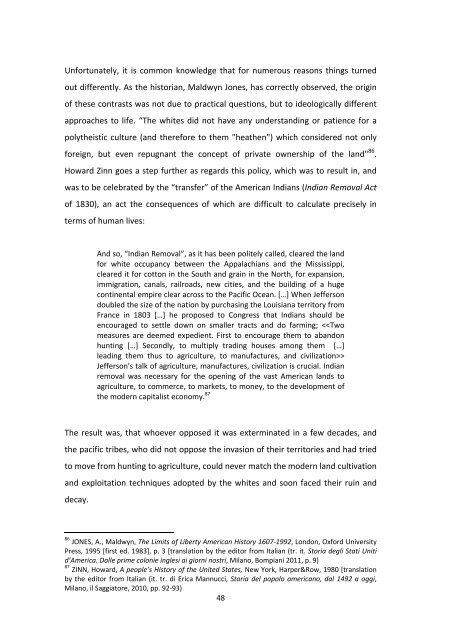building the american landscape - Univerza v Novi Gorici
building the american landscape - Univerza v Novi Gorici
building the american landscape - Univerza v Novi Gorici
Create successful ePaper yourself
Turn your PDF publications into a flip-book with our unique Google optimized e-Paper software.
Unfortunately, it is common knowledge that for numerous reasons things turned<br />
out differently. As <strong>the</strong> historian, Maldwyn Jones, has correctly observed, <strong>the</strong> origin<br />
of <strong>the</strong>se contrasts was not due to practical questions, but to ideologically different<br />
approaches to life. “The whites did not have any understanding or patience for a<br />
poly<strong>the</strong>istic culture (and <strong>the</strong>refore to <strong>the</strong>m "hea<strong>the</strong>n") which considered not only<br />
foreign, but even repugnant <strong>the</strong> concept of private ownership of <strong>the</strong> land" 86 .<br />
Howard Zinn goes a step fur<strong>the</strong>r as regards this policy, which was to result in, and<br />
was to be celebrated by <strong>the</strong> “transfer” of <strong>the</strong> American Indians (Indian Removal Act<br />
of 1830), an act <strong>the</strong> consequences of which are difficult to calculate precisely in<br />
terms of human lives:<br />
And so, “Indian Removal”, as it has been politely called, cleared <strong>the</strong> land<br />
for white occupancy between <strong>the</strong> Appalachians and <strong>the</strong> Mississippi,<br />
cleared it for cotton in <strong>the</strong> South and grain in <strong>the</strong> North, for expansion,<br />
immigration, canals, railroads, new cities, and <strong>the</strong> <strong>building</strong> of a huge<br />
continental empire clear across to <strong>the</strong> Pacific Ocean. […] When Jefferson<br />
doubled <strong>the</strong> size of <strong>the</strong> nation by purchasing <strong>the</strong> Louisiana territory from<br />
France in 1803 […] he proposed to Congress that Indians should be<br />
encouraged to settle down on smaller tracts and do farming; <br />
Jefferson's talk of agriculture, manufactures, civilization is crucial. Indian<br />
removal was necessary for <strong>the</strong> opening of <strong>the</strong> vast American lands to<br />
agriculture, to commerce, to markets, to money, to <strong>the</strong> development of<br />
<strong>the</strong> modern capitalist economy. 87<br />
The result was, that whoever opposed it was exterminated in a few decades, and<br />
<strong>the</strong> pacific tribes, who did not oppose <strong>the</strong> invasion of <strong>the</strong>ir territories and had tried<br />
to move from hunting to agriculture, could never match <strong>the</strong> modern land cultivation<br />
and exploitation techniques adopted by <strong>the</strong> whites and soon faced <strong>the</strong>ir ruin and<br />
decay.<br />
86 JONES, A., Maldwyn, The Limits of Liberty American History 1607‐1992, London, Oxford University<br />
Press, 1995 [first ed. 1983], p. 3 [translation by <strong>the</strong> editor from Italian (tr. it. Storia degli Stati Uniti<br />
d’America. Dalle prime colonie inglesi ai giorni nostri, Milano, Bompiani 2011, p. 9)<br />
87 ZINN, Howard, A people’s History of <strong>the</strong> United States, New York, Harper&Row, 1980 [translation<br />
by <strong>the</strong> editor from Italian (it. tr. di Erica Mannucci, Storia del popolo <strong>american</strong>o, dal 1492 a oggi,<br />
Milano, il Saggiatore, 2010, pp. 92‐93)<br />
48
















